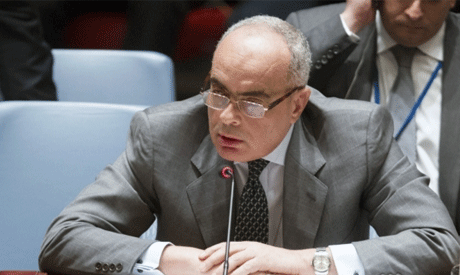
H.E. Amr Abdellatif Aboulatta, Chair of the Counter-Terrorism Committee. (Photo: .un.org)
The UN Security Council unanimously adopted a resolution on Wednesday aimed at curbing the supply of weapons to terrorists by urging countries to take legal action against suppliers and to trace small and light arms.
The council "strongly condemned" the continued flow of weapons, military equipment, drones and improvised explosive devices to Daesh, Al Qaeda and their affiliates as well as illegal armed groups and criminals.
The resolution, sponsored by Egypt, urges the UN's 193 member states to "to prevent and disrupt procurement networks for weapons" and ensure "taking appropriate legal actions against those who are knowingly engaged in providing terrorists with weapons."
Egypt is the current representative of Arab countries on the UN Security Council.
Member states were also encouraged, according to the resolution, to take procedures of marking and tracing small arms and light weapons to improve their traceability and to boost their judicial and border-control procedures.
"This is the first resolution of its kind addressing in detail how to prevent terrorists from acquiring weapons," Egypt's ambassador to the UN, Amr Abdellatif Aboulatta, who is also chair of the council's counter-terrorism committee, told council members.
"Arming of terrorists and terrorist organisations is extremely dangerous; [it] is a crime that is no less heinous than the terrorist act itself,” Aboulatta was quoted as saying by a foreign ministry statement.
He said the resolution also urges the prevention of smuggling of arms to terrorists in conflict zones, strengthening cooperation to prevent terrorists from acquiring weapons through the internet and social media, and bolstering international judicial cooperation and law enforcement in relation to the issue.
The deputy director of the counter-terrorism council’s executive directorate, Weixiong Chen, said preventing and eliminating the supply of weapons to terrorists is a "complex task."
“But please rest assured that CTED that [the Counter-Terrorism Committee Executive Directorate] will continue to strengthen its engagement with its UN and international and regional partners, in accordance with the relevant Council resolutions, to assist Member States to deny terrorists access to weapons,” he said, according to the UN website.
Yury Fedotov, the executive director of the UN Office on Drugs and Crime (UNODC) emphasised the importance of cross-border cooperation.
Speaking via video-teleconference from Vienna, Fedotov told the council about challenges in detecting and prosecuting illicit weapon traffickers, including "inadequate regulatory environments and data collection; lack of specialised skills and equipment; and lack of coordination within and between countries and regions."
"We need to further strengthen cross-border partnerships and operational responses, promote the involvement of diverse stakeholders, including the private sector, and step up tailored assistance to address gaps in capacity,” he said.
Emmanuel Roux, terpol's special representative, highlighted the importance of tracing weapons back to their sources.
“Traditionally, investigations would end at this point, with the seizure of a firearm. Interpol suggests that the recovery of a weapon is just the beginning,” he said.
He called for strengthening and integrating border management to "prevent the mobility of the individuals using weapons, such as foreign terrorist fighters."
Short link: